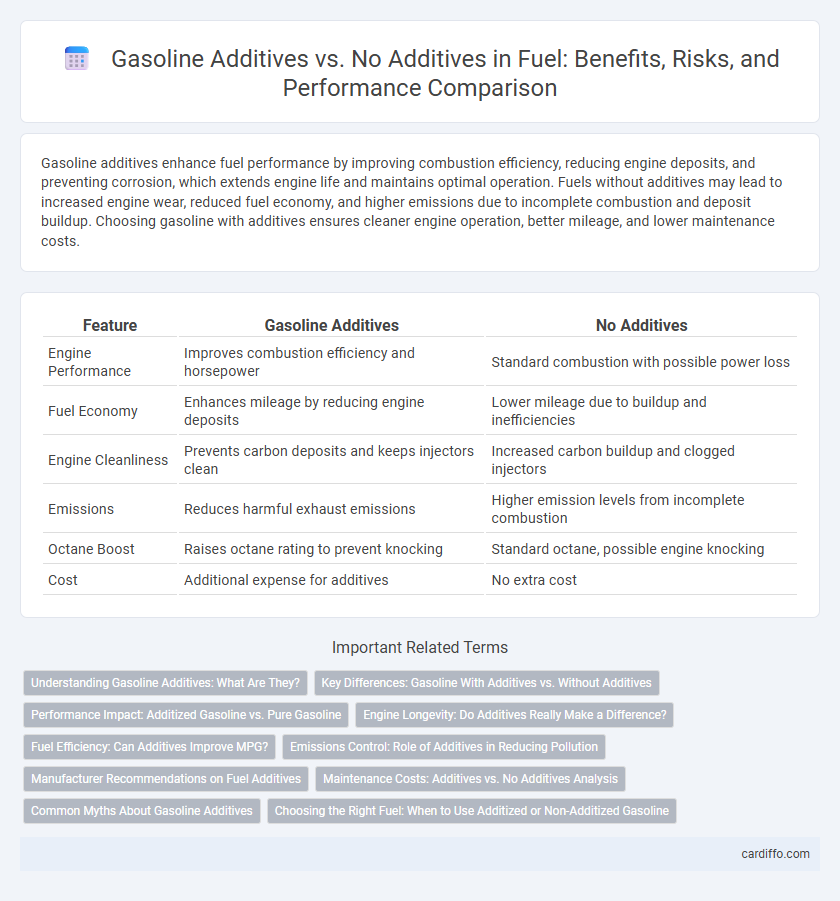Gasoline additives enhance fuel performance by improving combustion efficiency, reducing engine deposits, and preventing corrosion, which extends engine life and maintains optimal operation. Fuels without additives may lead to increased engine wear, reduced fuel economy, and higher emissions due to incomplete combustion and deposit buildup. Choosing gasoline with additives ensures cleaner engine operation, better mileage, and lower maintenance costs.
Table of Comparison
| Feature | Gasoline Additives | No Additives |
|---|---|---|
| Engine Performance | Improves combustion efficiency and horsepower | Standard combustion with possible power loss |
| Fuel Economy | Enhances mileage by reducing engine deposits | Lower mileage due to buildup and inefficiencies |
| Engine Cleanliness | Prevents carbon deposits and keeps injectors clean | Increased carbon buildup and clogged injectors |
| Emissions | Reduces harmful exhaust emissions | Higher emission levels from incomplete combustion |
| Octane Boost | Raises octane rating to prevent knocking | Standard octane, possible engine knocking |
| Cost | Additional expense for additives | No extra cost |
Understanding Gasoline Additives: What Are They?
Gasoline additives are chemical compounds formulated to improve fuel performance, enhance engine efficiency, and reduce emissions by preventing deposit buildup and corrosion. They include detergents, antioxidants, and corrosion inhibitors designed to optimize combustion and maintain engine health. Understanding the specific roles of these additives helps consumers make informed choices about fuel quality and engine maintenance.
Key Differences: Gasoline With Additives vs. Without Additives
Gasoline with additives contains chemical compounds designed to enhance engine performance, improve fuel combustion, and reduce emissions, while gasoline without additives lacks these enhancements, leading to potential buildup of deposits and reduced efficiency. Additives often include detergents, corrosion inhibitors, and antioxidants that protect engine components and maintain cleaner fuel injectors. Using gasoline with additives typically results in smoother engine operation, better mileage, and prolonged engine lifespan compared to fuel without additives.
Performance Impact: Additized Gasoline vs. Pure Gasoline
Gasoline additives enhance fuel combustion efficiency and engine performance by cleaning injectors, preventing deposit buildup, and improving octane stability, resulting in smoother acceleration and reduced emissions. Pure gasoline without additives may lead to engine deposits, decreased fuel economy, and increased knocking due to lower octane stability. Studies show vehicles using additized gasoline experience up to a 5% increase in miles per gallon (MPG) and longer engine life compared to those using non-additive fuel.
Engine Longevity: Do Additives Really Make a Difference?
Gasoline additives enhance engine longevity by reducing deposits, preventing corrosion, and improving combustion efficiency, which helps maintain optimal engine performance over time. Engines running on fuel with additives show less wear and fewer mechanical issues compared to those using untreated gasoline, leading to extended engine lifespan. Studies reveal that while basic fuel can function adequately, additives provide measurable protection that reduces maintenance costs and prolongs engine durability.
Fuel Efficiency: Can Additives Improve MPG?
Gasoline additives are formulated with detergents and friction modifiers designed to improve engine cleanliness and reduce internal wear, which can enhance fuel combustion efficiency and potentially increase miles per gallon (MPG). Studies indicate that certain additives can restore lost fuel economy by removing deposits from fuel injectors and intake valves, leading to optimized air-fuel mixture and smoother engine performance. However, real-world MPG improvements vary depending on vehicle condition and additive quality, with gains typically ranging from 1% to 5%.
Emissions Control: Role of Additives in Reducing Pollution
Gasoline additives play a critical role in emissions control by enhancing fuel combustion efficiency and reducing harmful pollutants such as carbon monoxide and nitrogen oxides. These additives promote cleaner engine operation, leading to lower tailpipe emissions and improved air quality. In contrast, gasoline without additives tends to produce higher levels of exhaust pollutants, contributing to increased environmental pollution and regulatory non-compliance.
Manufacturer Recommendations on Fuel Additives
Manufacturer recommendations on fuel additives emphasize using gasoline additives that meet specific formulations designed to enhance engine performance and reduce emissions. Gasoline additives approved by car manufacturers often contain detergents and stabilizers that prevent deposit buildup in fuel injectors and intake valves, ensuring optimal fuel combustion. Ignoring these guidelines by using no additives or unapproved products can lead to decreased fuel efficiency, increased engine wear, and potential warranty issues.
Maintenance Costs: Additives vs. No Additives Analysis
Using gasoline additives can significantly reduce engine deposits and improve fuel efficiency, leading to lower long-term maintenance costs compared to fuels without additives. Engines fueled without additives may experience increased carbon buildup and wear, resulting in more frequent and costly repairs. Studies show that vehicles using additive-enhanced gasoline can save up to 20% on maintenance expenses over their lifespan due to improved engine performance and reduced component degradation.
Common Myths About Gasoline Additives
Gasoline additives often face misconceptions, such as the belief that all additives significantly improve engine performance or fuel efficiency, whereas only specific formulations target particular engine issues like deposit removal or octane boosting. Another common myth is that additives can compensate for poor-quality fuel, but their effectiveness depends on the base fuel quality and additive concentration. Understanding the chemical properties and proper use of gasoline additives prevents unrealistic expectations and promotes engine health.
Choosing the Right Fuel: When to Use Additized or Non-Additized Gasoline
Gasoline additives enhance fuel performance by cleaning injectors, preventing deposit buildup, and improving combustion efficiency, making them ideal for older engines or vehicles exposed to harsh conditions. Non-additized gasoline suits modern engines with advanced fuel systems designed for cleaner operation, reducing unnecessary chemical exposure and cost. Understanding engine requirements and driving habits helps determine when to select additized fuel for optimal performance and maintenance.
Gasoline Additives vs No Additives Infographic

 cardiffo.com
cardiffo.com